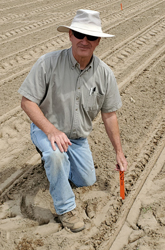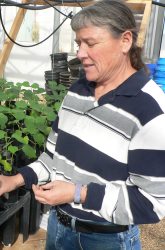 Steve M. Brown is a 1978 graduate in agronomy and soils from Auburn University and later earned MS and PhD degrees in agronomy/weed science at Auburn and Texas A&M, respectively. He worked as an assistant county agent in a cotton pest management role for a couple of years in northern Alabama and then served as a research associate in a Cotton Incorporated-funded project on no-till cotton from 1980 to 1984. From 1987 until 2008, he served as an Extension weed scientist and cotton agronomist for the University of Georgia in Tifton. He worked for a major seed and biotechnology company from 2008 until 2019, when he joined the faculty at Auburn. His entire career has focused on cotton.
Steve M. Brown is a 1978 graduate in agronomy and soils from Auburn University and later earned MS and PhD degrees in agronomy/weed science at Auburn and Texas A&M, respectively. He worked as an assistant county agent in a cotton pest management role for a couple of years in northern Alabama and then served as a research associate in a Cotton Incorporated-funded project on no-till cotton from 1980 to 1984. From 1987 until 2008, he served as an Extension weed scientist and cotton agronomist for the University of Georgia in Tifton. He worked for a major seed and biotechnology company from 2008 until 2019, when he joined the faculty at Auburn. His entire career has focused on cotton.

Kathy S. Lawrence received a BS in agronomy from New Mexico State University and an MS and a PhD in plant pathology from Mississippi State University. Kathy began work with plant-parasitic nematodes as a PhD student, working on
Heterodera glycines and sudden death syndrome of soybean. Since 1999, she has served as a soilborne and foliar disease plant pathologist, focusing on nematode and fungal interaction in the Department of Entomology and Plant Pathology at Auburn University in Auburn, Alabama. Her current research focuses on developing holistic management systems for plant-parasitic nematode management of field crop systems.
Kathy S. Lawrence received a BS in agronomy from New Mexico State University and an MS and a PhD in plant pathology from Mississippi State University. Kathy began work with plant-parasitic nematodes as a PhD student, working on
Heterodera glycines and sudden death syndrome of soybean. Since 1999, she has served as a soilborne and foliar disease plant pathologist, focusing on nematode and fungal interaction in the Department of Entomology and Plant Pathology at Auburn University in Auburn, Alabama. Her current research focuses on developing holistic management systems for plant-parasitic nematode management of field crop systems.

Heather M. Kelly is an associate professor of plant pathology with a 70% Extension and 30% Research appointment in the Entomology and Plant Pathology Department at the University of Tennessee. She is stationed at the West Tennessee Research and Education Center in Jackson and is the leader of the UT Extension and Research disease management programs for field crops, including soybean, corn, cotton, and wheat. Dr. Kelly received her BS in biological sciences and her MS in science teaching from Florida State University and her PhD in plant pathology from the University of Florida. Dr. Kelly manages cooperative efforts to develop disease management strategies and information that improve crop production efficiency.
Heather M. Kelly is an associate professor of plant pathology with a 70% Extension and 30% Research appointment in the Entomology and Plant Pathology Department at the University of Tennessee. She is stationed at the West Tennessee Research and Education Center in Jackson and is the leader of the UT Extension and Research disease management programs for field crops, including soybean, corn, cotton, and wheat. Dr. Kelly received her BS in biological sciences and her MS in science teaching from Florida State University and her PhD in plant pathology from the University of Florida. Dr. Kelly manages cooperative efforts to develop disease management strategies and information that improve crop production efficiency.

Terry Wheeler graduated with an MS from Texas A&M University in plant pathology and then a PhD from North Carolina State University in plant pathology. Both degrees were obtained with a specialization in plant nematology; work was conducted with root-knot nematode species on tobacco and peanut. Dr. Wheeler then worked as a research associate at the Ohio Agricultural Research and Extension Center in Wooster on potato early dying (a disease complex involving Verticillium wilt and lesion nematode) and then at Ohio State University on the soybean cyst nematode. In 1994, Dr. Wheeler moved to Lubbock, Texas, to work on cotton and peanut diseases in the southern High Plains of Texas for the Texas Agricultural Experiment Station (later renamed Texas A&M AgriLife Research). Nematodes are one of the most important and consistent issues facing cotton production in this region, and Dr. Wheeler has worked extensively in nematode management (chemical, germplasm, and crop rotation) with both the root-knot and the reniform nematodes.
Terry Wheeler graduated with an MS from Texas A&M University in plant pathology and then a PhD from North Carolina State University in plant pathology. Both degrees were obtained with a specialization in plant nematology; work was conducted with root-knot nematode species on tobacco and peanut. Dr. Wheeler then worked as a research associate at the Ohio Agricultural Research and Extension Center in Wooster on potato early dying (a disease complex involving Verticillium wilt and lesion nematode) and then at Ohio State University on the soybean cyst nematode. In 1994, Dr. Wheeler moved to Lubbock, Texas, to work on cotton and peanut diseases in the southern High Plains of Texas for the Texas Agricultural Experiment Station (later renamed Texas A&M AgriLife Research). Nematodes are one of the most important and consistent issues facing cotton production in this region, and Dr. Wheeler has worked extensively in nematode management (chemical, germplasm, and crop rotation) with both the root-knot and the reniform nematodes.
